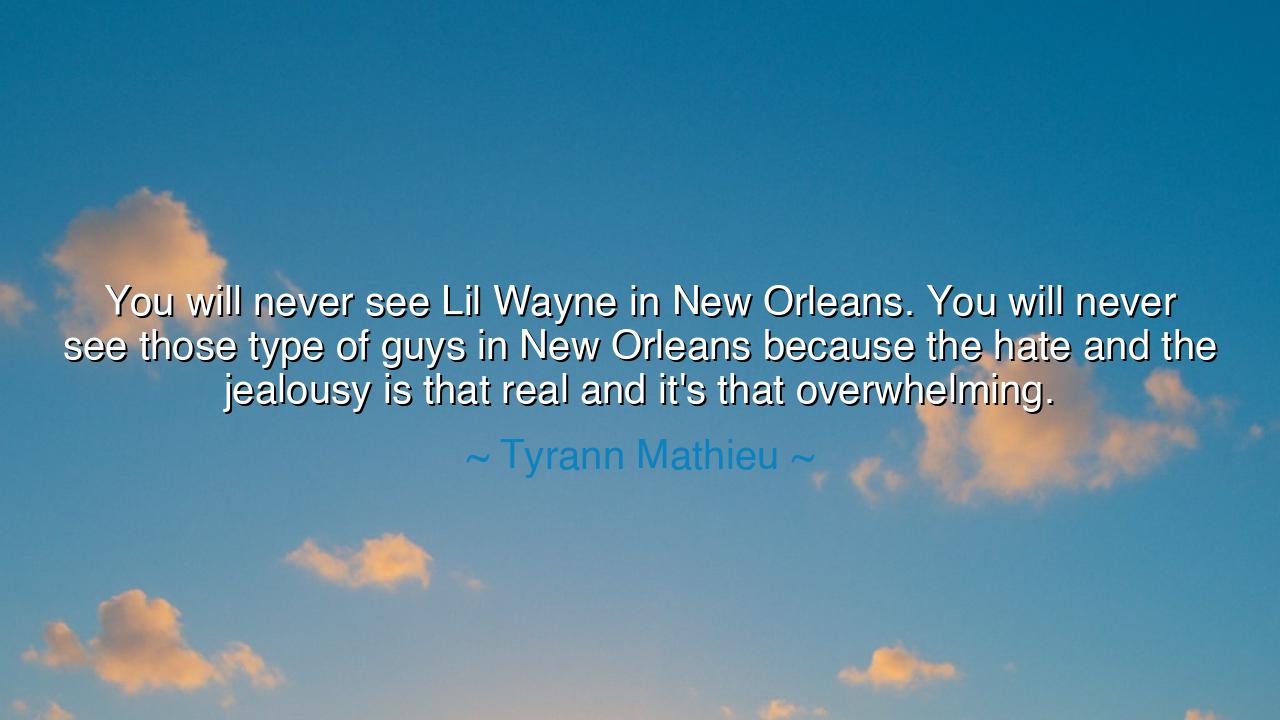
You will never see Lil Wayne in New Orleans. You will never see
You will never see Lil Wayne in New Orleans. You will never see those type of guys in New Orleans because the hate and the jealousy is that real and it's that overwhelming.






“You will never see Lil Wayne in New Orleans. You will never see those type of guys in New Orleans because the hate and the jealousy is that real and it's that overwhelming.” Thus spoke Tyrann Mathieu, the Honey Badger of the gridiron, a man forged in both triumph and adversity. His words are not only about a city, nor only about artists and athletes—they are about the universal truth of jealousy and hate, forces that often rise most fiercely against those who come from among us. His lament carries the weight of centuries: that prophets, heroes, and creators are often driven from their own homes, not by strangers, but by the envy of their neighbors.
The meaning of his words is plain yet piercing. In New Orleans, a city rich with culture and resilience, even those who rise to greatness may find themselves unwelcome, not because they have failed, but because they have succeeded. Hate and jealousy become chains that bind communities, poisoning the very soil from which greatness was born. Mathieu names the tragic paradox: that those who should be celebrated most by their people are sometimes driven away by envy, mistrust, or bitterness. Thus, men like Lil Wayne, born in the city, cannot freely dwell in it, for the weight of resentment is too heavy to bear.
The ancients, too, bore witness to this truth. Jesus of Nazareth declared that “a prophet is not without honor, save in his own country.” For in his homeland, those who knew him as a boy could not bear to honor him as a teacher. Likewise, Socrates was condemned by his own Athens, not because his wisdom was false, but because it disturbed the pride of his people. In every age, the story repeats: greatness is often rejected by its birthplace, for the familiar cannot easily accept the extraordinary.
History offers other echoes. Consider Joseph, sold into slavery by his own brothers, not because he was wicked, but because his father’s love and his prophetic dreams stirred envy. Or think of Malcolm X, who faced the fiercest opposition not only from distant enemies, but also from divisions among his own community. Their stories, like Mathieu’s lament, reveal how jealousy can burn hotter when the flame of greatness rises too close to home.
Yet hidden within this tragedy is a lesson of endurance. For while envy may drive the great from their homes, it cannot silence their voices nor diminish their impact. Lil Wayne, though absent from the streets of New Orleans, carries the sound of the city across the world. Tyrann Mathieu himself, though once cast aside by critics, rose again to prove his worth on the grandest stage. Their absence from their birthplace does not erase their roots; rather, it shows that sometimes greatness must rise above bitterness in order to flourish.
The lesson for us, then, is twofold. First, we must guard our hearts against the poison of jealousy. When someone from among us rises, let us not resent them but rejoice, for their greatness is a mirror of what we, too, might become. Second, for those who bear the weight of others’ envy, let it not turn to despair. Walk boldly, even if the path leads away from home. Carry your roots with you, but do not let them bind you. For the measure of greatness is not where you dwell, but what you give to the world.
So let Mathieu’s words be remembered as both warning and wisdom: “The hate and the jealousy is that real and it’s that overwhelming.” Let us rise above that darkness, honoring greatness wherever it appears, especially in our own midst. For if we choose love over envy, support over scorn, then our communities will not drive away their brightest stars, but will shine with them, lifted together toward a future radiant with hope.






AAdministratorAdministrator
Welcome, honored guests. Please leave a comment, we will respond soon